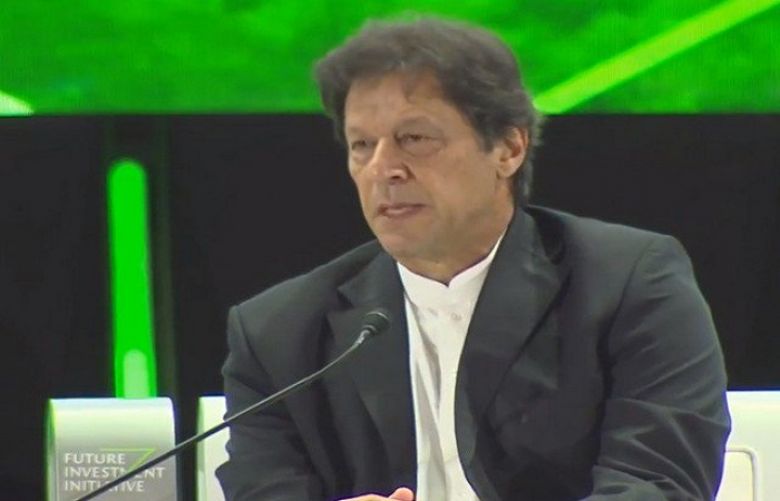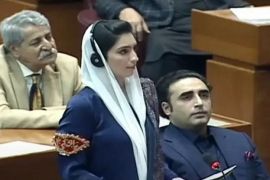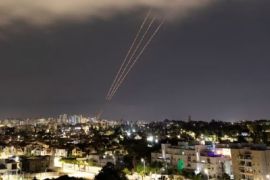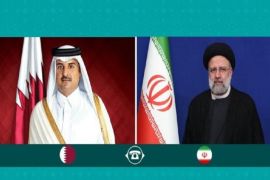Prime Minister Imran Khan on Tuesday addressed the Future Investment Initiative (FII) conference in Saudi Arabia and highlighted some of the key challenges facing his government and his plans to tackle them.
"We need new loans to pay-off our previous loans," the premier said while speaking about Pakistan's current economic situation. "We have approached the International Monetary Fund and our friendly countries," he added.
PM Imran further said he has spoken to Saudi Crown Prince Mohammed bin Salman about boosting investment ties between the two countries.
Stating that his government has been in power for 60 days, the premier said, "The immediate concern for our government is to increase our exports so we can bolster our foreign exchange reserves."
Warning that the next three to six months will be difficult for Pakistan, PM Imran said, "Our institutions were destroyed as corrupt people were in top positions but we are taking measures to increase exports."
"Pakistan's strength is overseas Pakistanis and we have to make conditions favourable for them to invest in the country," he said. The premier announced, "We are working to create a favourable environment for investment in the country and will introduce a one-window operation for it."
"We need to increase foreign reserves with remittances from the 8 to 9 million Pakistanis working abroad, need to give incentives to exporters and create opportunities for investment,” he added. He also asserted, "We need to clamp down on money laundering".
Speaking about his Naya Pakistan Housing Programme, PM Imran said, "There is a need for 10 million houses in Pakistan and we have embarked on a programme to build 5 million houses in the initial phase."
PM Imran further said, "We are restructuring our duty and tax structure."
"Pakistan is a country with great potential and is one of the most diverse countries in the world," he said. "We have one of the biggest copper reserves," he upheld.
However, PM Imran regretted, "Pakistan suffered a lot from terrorism post-9/11."
"We want to give incentives to people in energy sector," the premier further said.
"Pakistan’s biggest resource are its people below the age of 30," he further maintained.
"This is the best time for investors to come to Pakistan," he announced.
PM Imran arrived in Saudi Arabia on Monday on a two-day official visit to attend the investment conference that numerous other world leaders and corporates have skipped over the issue of dissident journalist Jamal Khashoggi's death.
Khan, who landed in Medina and was welcomed by Governor Faisal bin Salman bin Abdulaziz Al Saud, paid a visit to the Roza-e-Rasool (PBUH) before departing for Riyadh to attend the Future Investment Initiative (FII) conference.
In Riyadh, Governor Faisal bin Bandar Al Saud and Khan Hasham Bin Saddique, the Pakistani Ambassador to Saudi Arabia, welcomed him at the King Khalid International Airport.
“The reason I feel I have to avail myself of this opportunity is because, in a country of 210 million people right now, we have the worst debt crisis in our history," he mentioned to the Middle East Eye (MEE) in an interview that was published on Monday.
The prime minister is also slated to meet Crown Prince Mohammed bin Salman, who, himself, is surrounded by controversy in what the world is calling Riyadh's alleged involvement in the orchestration of Khashoggi's murder in the Saudi consulate in Istanbul, Turkey.
The Pakistani premier told an interviewer before leaving for Riyadh that despite his concern over Khashoggi’s death, he could not skip the conference as “we’re desperate” for possible Saudi loans to shore up Pakistan’s economy.
“Unless we get loans from friendly countries or the IMF [International Monetary Fund], we actually won’t have, in another two or three months, enough foreign exchange to service our debts or to pay for our imports. So we’re desperate at the moment.”







